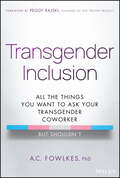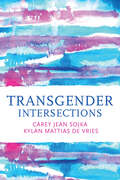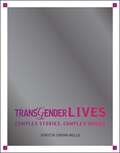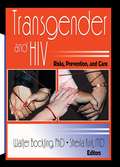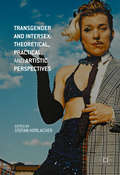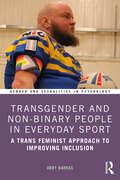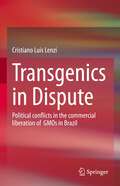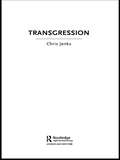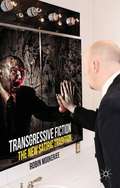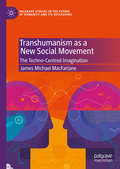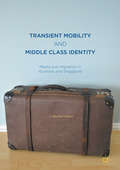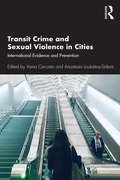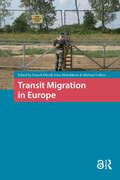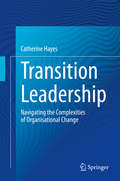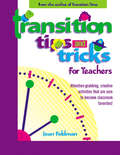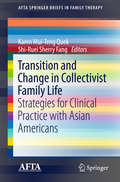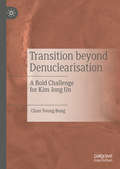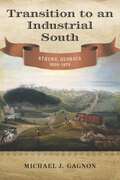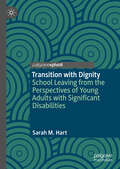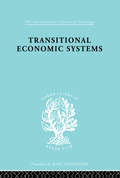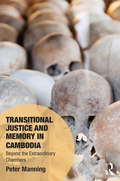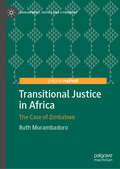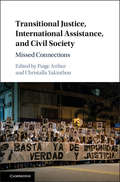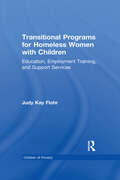- Table View
- List View
Transgender Inclusion: All the Things You Want to Ask Your Transgender Coworker but Shouldn't
by A. C. FowlkesDiscover the realities for transgender people in the workplace and beyond as they move through any of the three recognized kinds of transition—and how to be an ally. In Transgender Inclusion: All The Things You Want To Ask Your Transgender Coworker But Shouldn’t, clinical psychologist and trans inclusion specialist Dr. A.C. Fowlkes delivers an essential and remarkably honest discussion of the realities of the workplace for transgender people. In the book, you’ll explore the experiences that trans people have in the workplace as they move through none, one, or more of the three recognized kinds of transition—medical, social, and legal. You’ll learn answers to your questions about your transgender colleagues, so you can be respectful of your coworker’s feelings and work together comfortably. You’ll also find: Discussions of how and why transgender people often feel excluded from the workplace and by their colleagues Explorations of the unfortunately common reality of harassment and maltreatment of transgender workers How and why information about transgender experiences in the workplace is helpful to everyone Approximately 1.3 million adults in the United States identify as transgender. If you don’t already have a transgender friend, neighbor, or co-worker, you might very well have one in the future. A practical, compassionate, and evidence-based discussion of the transgender experience, Transgender Inclusion is a must-read guide for managers, executives, professionals, and allies who want to learn more and do more about trans issues in the workplace.
Transgender Intersections: Race and Gender through Identities, Interactions, and Systems of Power
by Carey Jean Sojka Kylan Mattias de VriesWhile transgender lives are at the forefront of contemporary politics, what do we really understand about the complexity of trans experience? Trans people who go through various aspects of gender transition experience shifts not only in their gender, but also with regards to other categories of identity such as race, social class, sexuality, disability, and more. Centering the stories of trans people and their loved ones, Sojka and de Vries investigate how intersectionality operates at various levels of social meaning – the individual, the interpersonal, and the structural – in the experiences of transgender people. Collectively, they present an argument about why gendered and racialized processes, in intersection, are central to understanding trans lives.
Transgender Lives: Complex Stories, Complex Voices
by Kirstin Cronn-Mills"I didn't hear the word transgender until I was eighteen, when a person I was dating came out as trans. My boyfriend came out as my girlfriend, and I thought, 'What . . . is that?' She said, 'I just don't think I'm a man.' And I said, 'Guess what? Neither do I.' And then the skies parted, and I understood who I was."—Katie Burgess, nonprofit director and community activist/organizer Meet Katie, Hayden, Dean, Brooke, David, Julia, and Natasha. Each is transgender, and in this book, they share their personal stories. Through their narratives, you'll get to know and love each person for their humor, intelligence, perseverance, and passion. You'll learn how they each came to better understand, accept, and express their gender identities, and you'll follow them through the sorrows and successes of their personal journeys. Transgender Lives helps you understand what it means to be transgender in America while learning more about transgender history, the broad spectrum of transgender identities, and the transition process. You'll explore the challenges transgender Americans face, including discrimination, prejudice, bullying and violence, unequal access to medical care, and limited legal protections. For transgender readers, these stories offer support and encouragement. Transgender Lives is a space for trans* voices to be heard and to express the complexities of gender while focusing on what it means to be human.
Transgender and HIV: Risks, Prevention, and Care
by Edmond J Coleman Walter O Bockting Sheila KirkDeliver effective services to this growing population! This volume presents the first collection of reports on the impact of HIV/AIDS on the transgender community worldwide. It includes a thorough description of the unique HIV risks of transgender people and exposes their largely neglected health and social service needs. This unique book also reports on the first generation of prevention interventions targeting this community, discusses guidelines for providing sex reassignment services to HIV-positive transsexuals, and encourages collaboration between communities at risk, researchers, and people in the helping professions.The social stigma faced by this population adds to their risk of HIV infection. Low self-esteem, rejection, neglect, employment discrimination, disenfranchisement, and a desire for acceptance and validation are all contributing factors. Yet, as the editors point out, “On the positive side, the transgender community has been able to mobilize and empower itself, and has found a voice that no longer can be ignored. We call on transgender and nontransgender people alike to work together to advance HIV prevention and promote our sexual health.”In Transgender and HIV you'll encounter: extensive discussions of the health, social service, and HIV prevention needs of the transgender community tips on how to work with marginalized communities in an empowering way explorations of the sexuality of both male-to-female and female-to-male transsexuals first-ever findings on sex reassignment surgery on HIV-positive individuals guidelines for surgery on HIV-positive transsexualsTransgender and HIV provides much-needed and often-requested information on HIV prevalence, risks, prevention, and care for this increasingly visible community.
Transgender and Intersex: Theoretical, Practical, and Artistic Perspectives
by Stefan HorlacherThis book takes both transgender and intersex positions into account and asks about commonalities and strategic alliances in terms of knowledge, theory, philosophy, art, and life experience. It strikes a balance between works on literature, film, photography, sports, law, and general theory, bringing together humanistic and social science approaches. Horlacher adopts a non-hierarchical perspective and asks how transgender and intersex issues are conceptualized from a variety of different viewpoints and to what extent artistic and creative discourses offer their own uniquely relevant forms of knowledge and expression.
Transgender and Non-Binary People in Everyday Sport: A Trans Feminist Approach to Improving Inclusion (Gender and Sexualities in Psychology)
by Abby BarrasThis formative work discusses transgender people’s inclusion in everyday sport in the United Kingdom. It adopts a trans feminist approach to explore pivotal issues regarding the barriers to participation faced by transgender and non-binary people.Offering a critical perspective on the current landscape surrounding this topic, the book draws from insightful interviews conducted by the author with 18 transgender and non-binary individuals. The author uses a critical social science approach to explore the heteropatriarchal construction of sport in the modern industrialised West, and how this has formed the backdrop to the continuing discrimination towards many athletes, not just those who are transgender. Using first-hand perspectives, it focuses on the three themes of the sporting body, sporting spaces and sporting communities. It investigates why conversations about fairness and safety regarding transgender athletes have become so polarised within the media, and the significance of taking a trans feminist approach to reducing barriers in sport. Lastly, the book’s key findings initiate a dialogue on the importance of gender affirmation in sport, the value of supportive teammates/role models and how sporting spaces can be reimagined to promote greater inclusion for all.Transgender and Non-Binary People in Everyday Sport is a crucial resource for researchers, academics, and students in the field of social science, sports organisations, policy makers, third-sector organisations, activists and other related disciplines. The book will also be a compelling read for anyone with an interest in improving inclusion for transgender and non-binary people in everyday sport and wants to learn more about how trans feminism can achieve this.
Transgenics in Dispute: Political conflicts in the commercial liberation of GMOs in Brazil
by Cristiano Luis LenziThis book analyses the conflict over the release of transgenic soybean in Brazil based on a narrative analysis of political conflict. At the end of the 1990s, the commercial release of Roundup Ready (RR) soybean triggered a heated debate over the introduction of genetically modified organisms (GMOs) in Brazilian agriculture, which developed into an open political conflict opposing pro- and anti-GMOs groups in Brazilian society. This volume examines some of the structuring axes of this conflict by applying a narrative analysis of political conflict. In this approach, politics is perceived as a process of interpretive conflict in which participants in the political game seek to establish the lines that delimit the very definition of public issues under debate. The issue of GMOs is understood, from this perspective, as a public controversy whose dynamics are shaped by the discourses that emerge from the dispute itself. To analyze these controversies, the book focuses on three axes of narrative analyses: the conflict over distributives issues associated with the commercial release of RR soy; the conflict over scientific uncertainty associated with the environmental risks of GMOs; and the conflict over labeling policies. Transgenics in Dispute: Political Conflicts in the Commercial Liberation of GMOs in Brazil will be of interest to both social and environmental scientists concerned with the risks produced by the newest technologies that mediate our relationship with the environment and with the public debate that their use tends to provoke.This book is a translation of the original Portuguese edition “Transgênicos em disputa: Os conflitos políticos na liberação comercial dos OGMs no Brasil” by Cristiano Luis Lenzi, published in Brazil by Appris Editora in 2020. The translation was done with the help of artificial intelligence (machine translation by the service DeepL.com). The author has subsequently revised the text further in an endeavour to refine the work stylistically. Springer Nature works continuously to further the development of tools for the production of books and on the related technologies to support the authors.
Transgression (Key Ideas)
by Chris JenksTransgression is truly a key idea for our time. Society is created by constraint and boundaries, but as our culture is increasingly subject to uncertainty and flux we find it more and more difficult to determine where those boundaries lie. In this fast moving study, Chris Jenks ranges widely over the history of ideas, the major theorists, and the significant moments in the formation of the idea of transgression. He looks at the definition of the social and its boundaries by Durkheim, Douglas and Freud, at the German tradition of Hegel and Nietzsche and the increasing preoccupation with transgression itself in Baudelaire, Bataille and Foucault. The second half of the book looks at transgression in action in the East End myth of the Kray twins, in Artaud's theatre of cruelty, the spectacle of the Situationists and Bakhtin's analysis of carnival. Finally Jenks extends his treatment of transgression to its own extremity.
Transgressive Fiction
by Robin MookerjeeOften dismissed as sensationalist, transgressive fiction is a sophisticated movement with roots in Menippean satire and the Rabelaisian carnal folk sensibility praised by Bakhtin. This study, the first of its kind, provides a thorough literary background and analysis of key transgressive authors such as Acker, Amis, Carter, Ellis, and Palahniuk.
Transhumanism as a New Social Movement: The Techno-Centred Imagination (Palgrave Studies in the Future of Humanity and its Successors)
by James Michael MacFarlaneThis book explores Technological Human Enhancement Advocacy through ethnographically inspired participant observation across a range of sites. James Michael MacFarlane argues that such advocacy is characterized by ‘Techno-centrism,' a belief grounded in today’s world while being also future-oriented and drawn from the imagination. This blurring of ‘real’ and ‘imagined’ futures borrows from the materialist grounding of the scientific worldview, while granting extended license to visions for technology as an enabler of forward-facing action, which include reviving humanist ideals associated with the modernization project. While Techno-centrism is arguably most pronounced in transhumanism—where it is acted-out in extreme, almost hyperbolic ways—it reflects more generally held, deep-seeded concerns around the future of science, technology and human self-identity in the new millennium. Far from being new, these emerging social forms capture unresolved ambivalences which have long cast a shadow over late-modern society and culture.
Transient Mobility and Middle Class Identity
by Catherine GomesThis book offers an understanding of the transient migration experience in the Asia-Pacific through the lens of communication and entertainment media. It examines the role played by digital technologies and uncovers how the combined wider field of entertainment media (films, television shows and music) are vital and helpful platforms that positively aid migrants through self and communal empowerment. This book specifically looks at the upwardly mobile middle class transient migrants studying and working in two of the Asia-Pacific's most desirable transient migration destinations - Australia and Singapore - providing a cutting edge study of the identities transient migrants create and maintain while overseas and the strategies they use to cope with life in transience.
Transit Crime and Sexual Violence in Cities: International Evidence and Prevention
by Vania CeccatoHow cities are planned and designed has a major impact on individuals’ mobility and safety. If individuals feel unsafe in public transportation or on the way to it, they may avoid certain routes or particular times of the day. This is problematic, since research has also found that, in some cities, especially those in the Global South, a large percentage of women are "transit captives". Namely, they have relatively less access to non-public forms of transportation and are, therefore, especially reliant on public transport. This issue is important not only because it affects people’s safety but also because it influences the long-term sustainability of a city. In a sustainable city, safety guarantees the ability to move freely for everyone and provides a wider sense of place attachment. Transit Crime and Sexual Violence in Cities examines the evidence of victimization in transit environments in countries around the world, exploring individuals’ feelings of perceived safety or lack thereof and the necessary improvements that can make transit safer and, hence, cities more sustainable. The book’s contributions are grounded in theories at the crossroads of several disciplines such as environmental criminology, architecture and design, urban planning, geography, psychology, gender and LGBTQI studies, transportation, and law enforcement. International case studies include Los Angeles, Vancouver, Stockholm, London, Paris, São Paulo, Mexico City, Bogotá, Tokyo, Guangzho, Melbourne, and Lagos, among others.
Transit Migration in Europe (IMISCOE Research)
by Michael Collyer Irina Molodikova Franck DüvellTransit migration, comprising mixed flows of refugees and labour, is widely considered a concern and even security threat. However, the concept is as vague and blurred as it is politicised. This volume offers evidence-based, comprehensive coverage of the entire belt of countries in the neighbourhood of the EU, ranging from Russia to Morocco. Transit migration is critically analyzed from the perspective of sending, transit and receiving countries, offering new insights into refugee and irregular migration flows, transnational migration networks and overlapping migration systems.
Transition Leadership: Navigating the Complexities of Organisational Change
by Catherine HayesIntegrating practitioner research with Buddhist philosophy, business and clinical psychology, this book provides a new perspective on leading change in organisations, supporting leaders and change professionals with insight into useful practices for today’s business environment. It identifies the unseen and overlooked complexities of the transition space, helping leaders to recognize patterns in their own leadership practices. This volume includes approaches for working at the intersection of complexity and ambiguity, and discusses how different mindsets impact behavior and outcomes which may get in the way of change agendas. It focuses on approaches for navigating the challenges of organisational transitions, while developing sustainable transition capabilities and practices A comprehensive new framework for understanding and shaping business management, Transition Leadership is a valuable resource for students and researches of business practices, work psychology, and transition and change, as well as current and future business and organizational leaders.
Transition Tips and Tricks for Teachers
by Jean FeldmanThe author of the best-selling book Transition Time brings you more attention-grabbing, creative activities that provide children with an outlet for wiggles, while giving their brains a jump start with cross-lateral movement games. Grab their attention with songs, games, and fingerplays for any time of the day. These classroom-tested ideas are sure to become favorites!
Transition and Change in Collectivist Family Life: Strategies for Clinical Practice with Asian Americans (AFTA SpringerBriefs in Family Therapy)
by Karen Mui-Teng Quek Shi-Ruei Sherry FangThis research-to-practice volume grounds clinicians in a robust, culturally-informed framework for conducting effective therapy with Asian-American couples, families, and individuals. Family, cultural, social, and spiritual dynamics are explored across ethnicities, generations, relationships, and immigrant/citizen experience to reflect a diverse, growing population. Discussion and case examples focus on contrasts, conflicts, and balances involved in acculturation and change, notably the shift from collectivist cultural tradition to a more independent view of the self, gender, choices, and relationships. The contributors’ finely shaded guidance and accessible approach will help therapists provide appropriate services for Asian-American clients without minimizing or pathologizing their experiences.Included in the coverage:How Asian American couples negotiate relational harmony: collectivism and gender equality.Through religion: working-class Korean immigrant women negotiate patriarchy.The role of Chinese grandparents in their adult children’s parenting practices in the United States.Balancing the old and the new: the case of second generation Filipino American women.Bicultural identity as a protective factor among Southeast Asian American youth who have witnessed domestic violence. Transition and Change in Collectivist Family Life is a cogent clinical resource for practitioners and mental health professionals with interests in Asian-American family therapy, psychotherapy, collectivism, and faith-based community and counseling.
Transition beyond Denuclearisation: A Bold Challenge for Kim Jong Un
by Chan Young BangThis book seeks to go beyond conventional literature on the North Korean nuclear issue by examining the chances of survival of the Kim Jong Un regime, both with and without the nuclear weapons program. It offers a detailed historical background of the dysfunctional North Korean economy, explores the contemporary socioeconomic condition of the country, examines the failures of the Six-party Talks and other attempts at negotiations with North Korea, and outlines a blueprint for the survival of the regime through rapid economic modernization to be put forward by the five stakeholder nations in exchange for dismantlement of the nuclear weapons program.
Transition in Survival: Enterprise Restructuring in Twenty East German and Hungarian Companies 1990-1997 (Routledge Revivals)
by Enese Lieb-DoczyThis title was first published in 2001. This work features different companies and their change in situation between 1990 and 1997. The author focused on changes in each company's vertical integration; its integration with and relationship to its investor; changes in its human resource policies and the general handling of labour shedding; changes in its product range, production methods, product markets and competitive situation; and the regional effects of FDI and changes in the company's procurement policies. The study comprises mainly of manufacturing companies with a few construction companies included to examine issues arising from localized company operations.
Transition to an Industrial South: Athens, Georgia, 1830--1870
by Michael J. GagnonMichael J. Gagnon is assistant professor of history at Georgia Gwinnett College.Renowned New South booster Henry Grady proposed industrialization as a basis of economic recovery for the former Confederacy. Born in 1850 in Athens, Georgia, to a family involved in the city's thriving manufacturing industries, Grady saw firsthand the potential of industrialization for the region. In Transition to an Industrial South, Michael J. Gagnon explores the creation of an industrial network in the antebellum South by focusing on the creation and expansion of cotton textile manufacture in Athens. By 1835, local entrepreneurs had built three cotton factories in Athens, started a bank, and created the Georgia Railroad. Although known best as a college town, Athens became an industrial center for Georgia in the antebellum period and maintained its stature as a factory hub even after competing cities supplanted it in the late nineteenth century. Georgia, too, remained the foremost industrial state in the South until the 1890s.Gagnon reveals the political nature of procuring manufacturing technology and building cotton mills in the South, and demonstrates the generational maturing of industrial laboring, managerial, and business classes well before the advent of the New South era. He also shows how a southern industrial society grew out of a culture of social and educational reform, economic improvements, and business interests in banking and railroading. Using Athens as a case study, Gagnon suggests that the connected networks of family, business, and financial relations provided a framework for southern industry to profit during the Civil War and served as a principal guide to prosperity in the immediate postbellum years.
Transition with Dignity: School Leaving from the Perspectives of Young Adults with Significant Disabilities
by Sarah M. HartThis book analyzes the process of leaving school, commonly referred to as 'transition' for young adults with severe, complex, and multiple disabilities. It seeks to challenge prevailing assumptions and offer practical steps towards reversing customary accepted theories, methods, practices, and outcomes. Despite extensive research, policies, and procedures of transition, the reality is that post-school outcomes are worrying for those with significant special needs. Community inclusion depends as much upon in-school procedures and support systems as it does the inclusivity of society itself. This book directly addresses these concerns by examining the experiences of young adults living through their transitions in two countries, Aotearoa New Zealand and the USA. Engaging and highly readable case narratives bring fresh insights on the diversity of disability experiences, portraying the under-explored opportunities involved in a transition with dignity. Disability is an often overlooked aspect of one’s intersectional identity. Post-school transition is therefore positioned less as a procedural function of leaving school and more so an urgent matter of social justice. Readers will benefit from the transformative framing of post-school transition based on the capability approach. Genuine opportunities within the transition of young adults with significant disabilities and those who support them may promote a thriving life for all.
Transitional Economic Systems: The Polish Czech Example (International Library of Sociology)
by Dorothy W. DouglasThis is Volume XI of a series of eleven of Economic and Society. Originally published in 1953, this includes a look at the Polish-Czech example- looking at the influence if USSR and bases of change in Poland; Czechoslovakia, commonalities and their transition to socialism.
Transitional Justice and Memory in Cambodia: Beyond the Extraordinary Chambers (Memory Studies: Global Constellations)
by Peter ManningMemories of violence, suffering and atrocities in Cambodia are today being pulled in different directions. A range of transitional justice practices have been put to work in the name of redressing, restoring and renewing memory. At the centre of this stage is the Extraordinary Chambers in the Courts of Cambodia (ECCC), a hybrid tribunal established to prosecute the leaders of the Khmer Rouge regime, under which 1.6 million Cambodians died of hunger or disease or were executed. This book unpicks the way memory is reconstructed through appeals to a national memory, the legal reframing and coding of memories as crimes, and bids to locate personal memories within collective biographies. Analysing the techniques and interventions of the ECCC, as well as exploring the role of non-governmental organisations (NGOs), the book explores the relationships in which Cambodian communities navigate memories of political violence. This book is essential for understanding transitional justice in Cambodia in, and beyond, the courtroom. Transitional Justice and Memory in Cambodia shows that the governing logic of transitional justice interventions – that societies are unable to 'deal with' memories of atrocity and violence without some form of transitional justice mechanism – neglects the complexity of memory and remembering in post-atrocity contexts and the agency of the subjects to which such mechanisms are addressed. Drawing on documentary sources, legal transcripts, interviews and participant observation data, the book situates transitional justice processes in Cambodia within a wider context of social and cultural memory politics, examining (old and new) conflicts of memory that have emerged between the varied accounts and uses of the past that exist in Cambodia now. As such, it will appeal to students and scholars in sociology, human rights, law and criminology.
Transitional Justice in Africa: The Case of Zimbabwe (Development, Justice and Citizenship)
by Ruth MurambadoroThis book provides insight on the effect of political violence and transitional justice in Africa focusing on Zimbabwe and comparing it to Rwanda, Uganda and Mozambique. The case of Zimbabwe is unique since political violence observed in some areas has manifested as contestations for power between members of various political parties. These political contestations have infiltrated family/clan structures at the community level and destroyed the human and social relations of people. Also, the author examines an understanding of how communities in the most polarized and conflict-ridden areas in Africa are addressing their past. The project would appeal to graduate students, academics, researchers and practitioners as it will help them to understand African justice systems and the complex network of relationships shaping justice processes during transitions.
Transitional Justice, International Assistance, and Civil Society: Missed Connections
by Paige Arthur Christalla YakinthouIn recent years, transitional justice has become increasingly international in its scope. Due to ongoing animosities, lack of political will, and the absence of credible governing or judicial institutions, international organizations, donors, and NGOs advocate for transitional justice initiatives like truth commissions or special tribunals - alongside national actors, like civil society and victims groups. This book examines how international assistance affects transitional justice, and where power truly lies in making decisions about justice for victims of massive human rights abuse. The book finds that government donors typically lack strategies for transitional justice, they struggle with information deficits, and they are constrained by short-term approaches that do not give enough attention to what is often a weak and divided civil society sector. All the authors have both practical and scholarly perspectives on transitional justice. Country case studies are provided, including descriptions of the challenges in developing data on transitional justice financing.
Transitional Programs for Homeless Women with Children: Education, Employment Traning, and Support Services (Children of Poverty)
by Judy K. FlohrFirst published in 1999. Routledge is an imprint of Taylor & Francis, an informa company.
